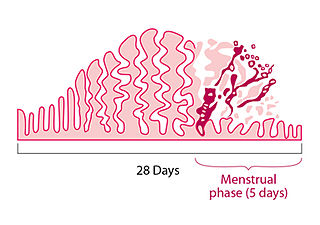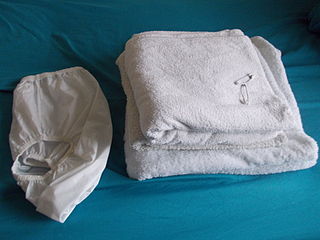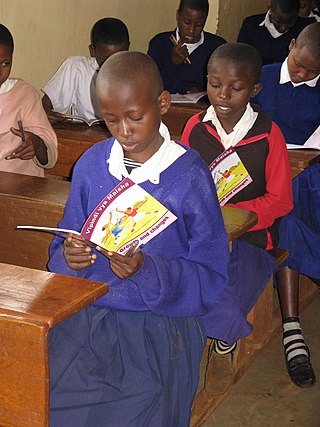
Menstruation is the regular discharge of blood and mucosal tissue from the inner lining of the uterus through the vagina. The menstrual cycle is characterized by the rise and fall of hormones. Menstruation is triggered by falling progesterone levels, and is a sign that pregnancy has not occurred.

A tampon is a menstrual product designed to absorb blood and vaginal secretions by insertion into the vagina during menstruation. Unlike a pad, it is placed internally, inside of the vaginal canal. Once inserted correctly, a tampon is held in place by the vagina and expands as it soaks up menstrual blood.

A menstrual cup is a menstrual hygiene device which is inserted into the vagina during menstruation. Its purpose is to collect menstrual fluid. Menstrual cups are made of elastomers. A properly fitting menstrual cup seals against the vaginal walls, so tilting and inverting the body will not cause it to leak. It is impermeable and collects menstrual fluid, unlike tampons and menstrual pads, which absorb it.

A menstrual pad is an absorbent item worn in the underwear when menstruating, bleeding after giving birth, recovering from gynecologic surgery, experiencing a miscarriage or abortion, or in any other situation where it is necessary to absorb a flow of blood from the vagina. A menstrual pad is a type of menstrual hygiene product that is worn externally, unlike tampons and menstrual cups, which are worn inside the vagina. Pads are generally changed by being stripped off the pants and panties, taking out the old pad, sticking the new one on the inside of the panties and pulling them back on. Pads are recommended to be changed every 3–4 hours to avoid certain bacteria that can fester in blood; this time also may differ depending on the kind worn, flow, and the time it is worn.

Feminine hygiene products are personal care products used for women's hygiene during menstruation, vaginal discharge, or other bodily functions related to the vulva and vagina. Products that are used during menstruation may also be called menstrual hygiene products, including menstrual pads, tampons, pantyliners, menstrual cups, menstrual sponges and period panties. Feminine hygiene products also include products meant to cleanse the vulva or vagina, such as douches, feminine wipes, and soap.

Goodnites are diapers designed for managing bedwetting. Goodnites are produced by Kimberly-Clark. The product has also been seen titled as Huggies Goodnites on official Huggies branded webpages.
An incontinence pad is a small, impermeable multi-layered sheet with high absorbency that is used in the incontinence and health-care industries as a precaution against fecal or urinary incontinence. It is generally made of cotton if washable, or nonwoven fabric paper if disposable. Incontinence diapers are a common incontinence pad. Incontinence pads are usually placed in an undergarment or on a bed or chair under a person. Incontinence pads are manufactured in light and heavy grades which offer a range of absorbencies, often referred to as a 'working capacity', which refers to the true absorbency an incontinence pad offers when in use. These sorts of pads can come as panty-liners, inserts, pads or even available as replacement underwear.
Always is an American brand of menstrual hygiene products, including maxi pads, ultra thin pads, pantyliners, disposable underwear for night-time wear, and vaginal wipes. A sister company of Procter & Gamble, it was first invented and introduced in the United States in 1983 by Tom Osborn, a mid-level employee at Procter & Gamble, then nationally in May 1984. By the end of 1984, Always had also been introduced internationally in the United Kingdom, Canada, France, Germany, Arab world, Pakistan and Africa. Despite the Always' pads runaway international success, Procter & Gamble almost fired Tom Osborn twice in the early 1980s as he was developing this product.

A cloth diaper or a cloth nappy, also known as reusable diaper or reusable nappy, is a diaper made from textiles such as natural fibers, human-made materials, or a combination of both. Cloth diapers are in contrast to disposable diapers, made from synthetic fibers and plastics. They are often made from industrial cotton which may be bleached white or left the fiber's natural color. Other natural fiber cloth materials include wool, bamboo, and unbleached hemp. Human-made materials such as an internal absorbent layer of microfiber toweling or an external waterproof layer of polyurethane laminate (PUL) may be used. Polyester fabrics microfleece or suedecloth are often used inside cloth diapers as a "stay-dry" wicking liner because of the non-absorbent properties of those synthetic fibers.

Cloth menstrual pads are cloth pads worn in the underwear to collect menstrual fluid. They are a type of reusable menstrual hygiene product, and are an alternative to sanitary napkins or to menstrual cups. Because they can be reused, they are generally less expensive than disposable pads over time, and reduce the amount of waste produced.

There are many cultural aspects surrounding how societies view menstruation. Different cultures view menstruation in different ways. The basis of many conduct norms and communication about menstruation in western industrial societies is the belief that menstruation should remain hidden. By contrast, in some indigenous hunter-gatherer societies, menstrual observances are viewed in a positive light, without any connotation of uncleanness. In most of India, menarche is celebrated as a rite of passage.
A papyrus sanitary pad, or Makapad, is a sanitary napkin made from papyrus, a natural material. It is reported to be 75 percent cheaper than a conventional menstrual pad and thus an advantage to the poor, as well as being highly absorbent. It is Africa's first hand-made menstrual hygiene product that is made completely with materials available locally, with its biggest production plant being in Kawempe. Makapad is an acronym used for menstruation, administration, knowledge, and affordability.

Arunachalam Muruganantham also known as Padman is a social entrepreneur from Coimbatore in Tamil Nadu, India. He is the inventor of a low-cost sanitary pad-making machine and is credited for innovating grassroots mechanisms for generating awareness about traditional unhygienic practices around menstruation in rural India. His mini-machines, which can manufacture sanitary pads for less than a third of the cost of commercial pads, have been installed in 23 of the 29 states of India in rural areas. He is currently planning to expand the production of these machines to 106 nations. The movie Period. End of Sentence. won the Academy Award for Best Documentary for the year 2018. The 2018 Hindi film Pad Man was made on his invention, where he was portrayed by Akshay Kumar.
GladRags is a feminine hygiene company based in Portland, Oregon that produces reusable cloth menstrual pads and menstrual cups.

Tampon tax is a popular term used to call attention to tampons, and other feminine hygiene products, being subject to value-added tax (VAT) or sales tax, unlike the tax exemption status granted to other products considered basic necessities. Proponents of tax exemption argue that tampons, menstrual pads, menstrual cups and comparable products constitute basic, unavoidable necessities for women, and any additional taxes constitute a pink tax.
Sustainable menstruation refers to the use of environmentally-friendly and responsible menstrual products.

Menstrual hygiene management (MHM) or menstrual health and hygiene (MHH) refers to access to menstrual hygiene products to absorb or collect the flow of blood during menstruation, privacy to change the materials, and access to facilities to dispose of used menstrual management materials. It can also include the "broader systemic factors that link menstruation with health, well-being, gender equality, education, equity, empowerment, and rights". Menstrual hygiene management can be particularly challenging for girls and women in developing countries, where clean water and toilet facilities are often inadequate. Menstrual waste is largely ignored in schools in developing countries, despite it being a significant problem. Menstruation can be a barrier to education for many girls, as a lack of effective sanitary products restricts girls' involvement in educational and social activities.

Period underwear are absorbent garments designed to be worn during menstruation. Period underwear is designed like conventional underwear but it is made up of highly absorbent fabrics to soak up menstrual blood. Most commercially manufactured period underwear makes use of microfiber polyester fabric. It is recommended that period underwear should be changed every 8-12 hours to avoid leakage and infection.
Eco Femme is a women-led social enterprise in Tamil Nadu, India, that produces organic washable cloth pads. Eco Femme was founded in 2009 in Auroville by Kathy Walkling and Jessamijn Miedema who started by producing, applying and selling these washable menstrual pads in Auroville. The aim was to produce pads that are both affordable and free of plastic. They were also interested in designing a sustainable alternative to disposable pads for the women of India as well as setting up self sustaining initiatives in cloth pad production for women from the neighbouring villages. All commercially sold pads are organically certified under GOTS and Eco Femme is the first in this space to have achieved this certification. The cloth pads are mostly made out of organic cotton and can last up to 75 washes or for three to five years from the time of purchasing. These pads are sold in more than 20 countries across the world. By 2022, Eco Femme has distributed over 1 million cloth pads which consequently saved more than 75 million single use disposable pads from reaching landfills.
A/S SABA, later SABA Mölnlycke A/S (1986–1996), was a Norwegian company that produced hygiene products such as menstrual pads, tampons, diapers, incontinence products and wet wipes. The company later became part of Sca Mölnlycke, Sca Hygiene Products, and Essity in turn; the name Saba is currently owned by Essity and used for a brand of feminine care products. The company was established in 1945 at Råel in the present-day municipality of Tønsberg, Vestfold. For a time, Saba had several hundred employees and was considered a cornerstone company in the district.












